
A convenience store, bodega, convenience shop, corner store or corner shop is a small retail store that stocks a range of everyday items such as coffee, groceries, fruits, vegetables, snacks, confectionery, soft drinks, ice creams, tobacco products, lottery tickets, over-the-counter drugs, toiletries, newspapers and magazines. In some jurisdictions, convenience stores are licensed to sell alcoholic drinks, although many jurisdictions limit such beverages to those with relatively low alcohol content, like beer and wine. The stores may also offer money order and wire transfer services, along with the use of a fax machine or photocopier for a small per-copy cost. Some also sell tickets or recharge smart cards, e.g. OPUS cards in Montreal or include a small deli. They differ from general stores and village shops in that they are not in a rural location and are used as a convenient supplement to larger stores.

A supermarket is a self-service shop offering a wide variety of food, beverages and household products, organized into sections. This kind of store is larger and has a wider selection than earlier grocery stores, but is smaller and more limited in the range of merchandise than a hypermarket or big-box market. In everyday U.S. usage, however, "grocery store" is often used to mean "supermarket".

The Commodore 16 is a home computer made by Commodore International with a 6502-compatible 7501 or 8501 CPU, released in 1984 and intended to be an entry-level computer to replace the VIC-20. A cost-reduced version, the Commodore 116, was mostly sold in Europe.

Castle Wolfenstein is a 1981 action-adventure game that was developed by Muse Software for the Apple II home computer. It is one of the earliest games to be based on stealth mechanics. An Atari 8-bit family port was released in 1982 and was followed by versions for Commodore 64 (1983) and MS-DOS (1984).

Supermarket Sweep is an American television game show. The format combines an ordinary team-based quiz show with the novel concept of a live, timed race through a supermarket. In the timed race, cameras follow the teams with shopping carts through a large vacated supermarket with several aisles; the value of items thrown into the cart determine the winning team. The original show was broadcast on ABC from December 20, 1965, to July 14, 1967. Later seasons aired on Lifetime from February 5, 1990, to June 16, 1995, and later from April 3, 2000, to May 23, 2003, with reruns airing until March 26, 2004. Another version of the show aired from October 18, 2020, to January 30, 2022, also on ABC.
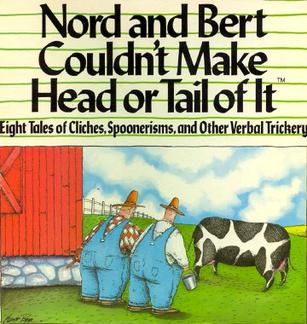
Nord and Bert Couldn't Make Head or Tail of It is an interactive fiction video game written by Jeff O'Neill and published by Infocom in 1987. It was released simultaneously for MS-DOS, Commodore 64, and other platforms. Nord and Bert was unique among Infocom games in that it used the game engine to present wordplay puzzles rather than an adventure story. It was Infocom's twenty-seventh game.
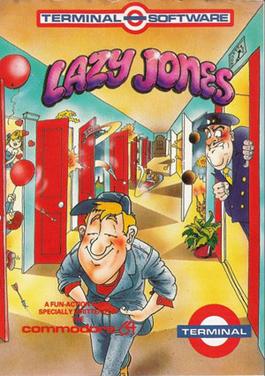
Lazy Jones is a platform game for the Commodore 64, ZX Spectrum, MSX and Tatung Einstein. It was written by David Whittaker and released by Terminal Software in 1984. The Spectrum version was ported by Simon Cobb.
Interceptor Micros, also known as Interceptor Software and later as Interceptor Group, was a British developer/publisher of video games for various 8-bit and 16-bit computer systems popular in Western Europe during the eighties and early nineties.
Flunky is an adventure game by Don Priestley for the ZX Spectrum, Commodore 64 and Amstrad CPC. It was published in 1987 by Piranha Software. The player takes control of a flunky in the service of the British Royal Family. The flunky is given orders by various members of the family which he must carry out. When he is successful in completing a task, he can obtain an autograph from the satisfied individual. Once he has successfully completed tasks for several persons he can go on to perform the final task for The Queen herself.
Ghost Manor is a horror video game released by Xonox in 1983 for the Atari 2600 and VIC-20. It was packaged in a double ended cartridge and a cassette tape along with one of three other games in an effort to appeal to budget conscious buyers who would purchase two games for the price of one cartridge and one cassette tape. There was also a more limited release of single ended cartridges and cassette tapes containing Ghost Manor by itself. The double ended cartridges and cassette tapes paired Ghost Manor with the platform game Spike's Peak, the fighting game Chuck Norris Superkicks, and a strategy game called Artillery Duel.

Captain America in: The Doom Tube of Dr. Megalomann, also known as Captain America Defies The Doom Tube, is a video game based on a comic book series of the same name. It was published in 1987 by U.S. Gold on their Go! label for computers including the Amstrad CPC and the Commodore 64 and was published a year later on the ZX Spectrum. Reviews were mixed, with the graphics and audio generally seen as poor. It is the first video game to feature Captain America.

Amazon Fresh is a subsidiary of the American e-commerce company Amazon in Seattle, Washington. It is a grocery retailer with physical stores and delivery services in most major U.S. cities, as well as some international cities, such as Berlin, Hamburg, London, Milan, Munich, Rome, Tokyo, and some other locations in Singapore and India.

Cloud Kingdoms is a puzzle game published by Millennium Interactive for the Amiga, Atari ST, Commodore 64, and MS-DOS in 1990. The player controls Terry, a green bouncing sphere, on a quest to recover his magic crystals that have been stolen by Baron von Bonsai. To do so, he must travel through the eponymous Cloud Kingdoms, avoiding enemies and hazards while collecting all of the crystals within the game's time limit. The game was developed by Dene Carter at Logotron, with sounds and music composed by David Whittaker.

Peter Shilton's Handball Maradona is a multiplatform association football simulation video game that was released in 1986 for the Amstrad CPC, Commodore 64 and ZX Spectrum. The game's title refers to the "hand of God" goal scored by Diego Maradona against England at the 1986 FIFA World Cup.

Batman is an action video game developed and published by Ocean Software based on the 1989 film of the same name. It was released on 11 September 1989 for the Commodore 64 and ZX Spectrum with Amiga, Amstrad CPC, Atari ST, MS-DOS and MSX versions following soon after.

Hero of the Golden Talisman is an action-adventure video game developed by British studio Mr Chip Software and published by Mastertronic in 1985 for the Commodore 64. A port to the Amstrad CPC followed. It is an early example of the Metroidvania style, despite preceding both of the genre's namesakes.
A Journey to the Centre of the Earth is a side-scrolling action-adventure platform game released for the Commodore 64 in 1984, and re-released by CRL in 1985 under the title Journey.
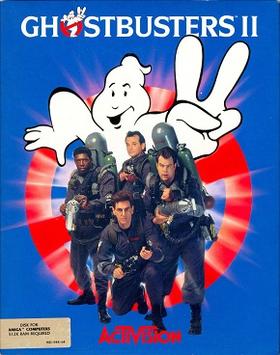
Ghostbusters II is a 1989 action game based on the film of the same name. It was published by Activision for various computer platforms. British studio Foursfield developed a version for Commodore 64, Amiga, Atari ST, Amstrad CPC and ZX Spectrum, which also got ported to the MSX by New Frontier. It features three levels based on scenes from the film. Dynamix developed a separate version for the DOS, also based on the film. The non-DOS versions were praised for the graphics and audio, but criticized for long loading times, disk swapping, and the final level. The DOS, Commodore 64 and Amiga versions were the only versions released in North America.
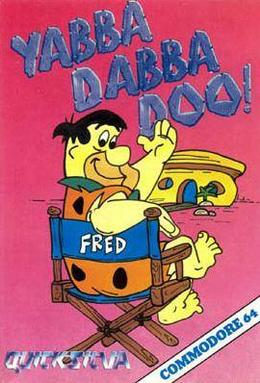
Yabba Dabba Doo! is a 1986 video game developed by British studio Taskset and published by Quicksilva for the Amstrad CPC, Commodore 64 (C64), and ZX Spectrum. It is based on the television series The Flintstones and is the first Flintstones video game.
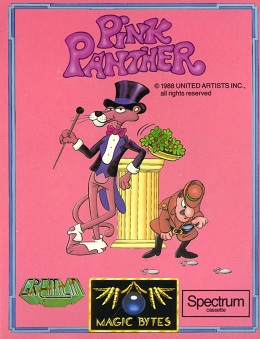
Pink Panther is a 1988 video game based on the character of the same name. It was developed by German company Magic Bytes and published by Gremlin Graphics. It was released in Europe for Amiga, Amstrad CPC, Atari ST, Commodore 64, and ZX Spectrum. Pink Panther was criticized for its control and difficulty, although the Amiga and Atari ST versions received praise for their graphics.
















